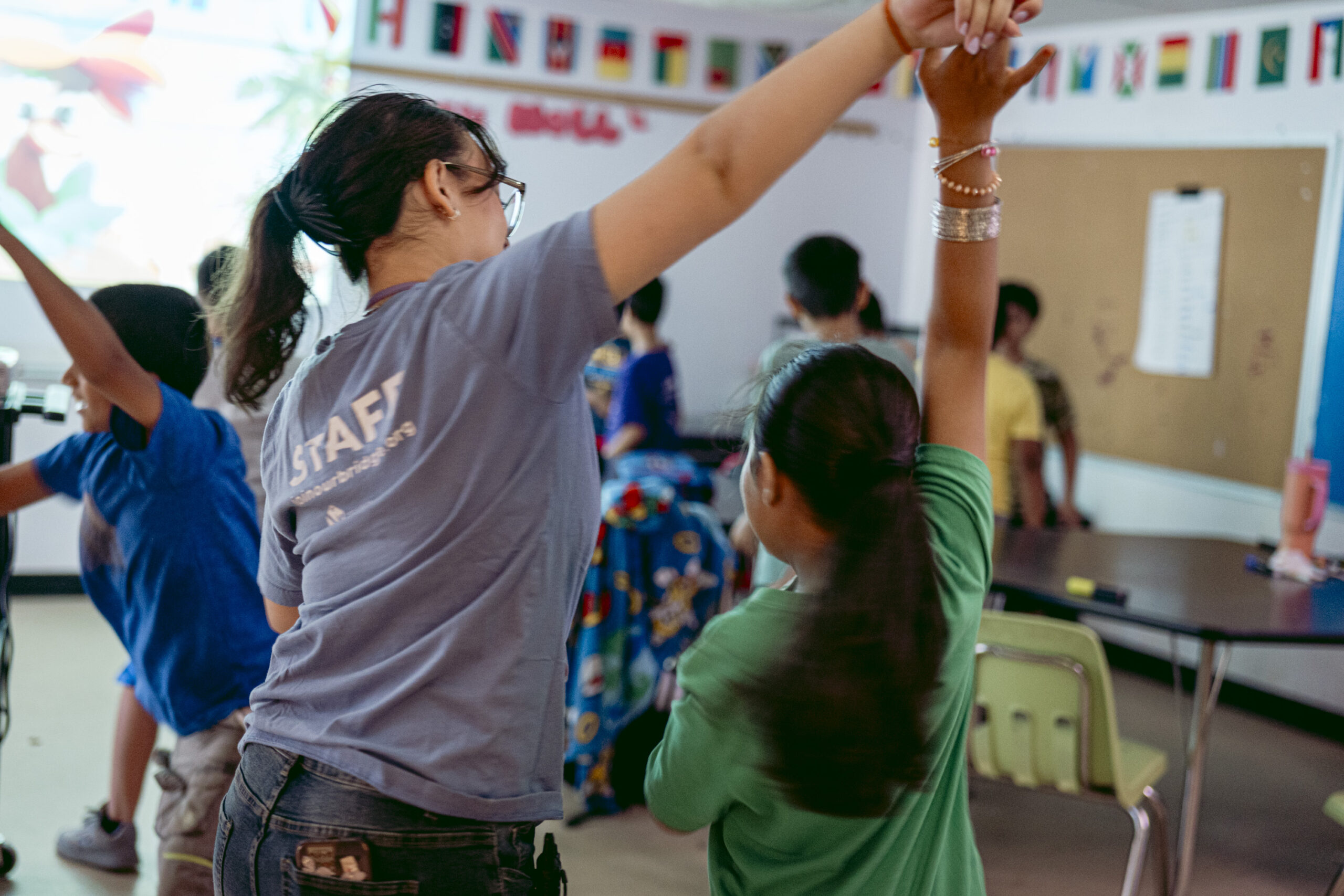“Booty-shakin’! Booty-shakin’! Booty-shakin’! Booty-shakin’!” the little boy at the front of the class hollered.
Or was he singing? Hard to say. Either way, he was fired up and getting the wiggles out, a scratched record of joy in a place where joy is the whole point.
Sil Ganzó stood in the back of the classroom, a world of troubles on her mind but a smile on her face. She’d just learned that the organization she founded 11 years ago to serve immigrant and refugee children, ourBRIDGE, faced a funding hit of more than $800,000 due to forces beyond her control. It’s a crisis for the nonprofit, she told me, but in the room with the booty-shaking, she found it hard to dwell.
“When they get here, it’s like a release,” Ganzó told me. “Kids screaming and singing. Hopping down the hall. We don’t tell them not to. That’s how it’s supposed to be.”
A little about this boy: He’s a fifth-grader who has any number of reasons to not be joyful. He’s from rural Afghanistan, born into a family that helped the U.S. government during our country’s 20-year military presence there, only to be forced to flee in 2021 amid a chaotic U.S. withdrawal that left the Taliban in power. This booty-shakin’ boy was 7 then, and had no choice: If his family stayed, they surely would have been killed.
The tens of thousands of Afghan refugees from that withdrawal went through a funnel — to the U.S., then to an individual state, then to a city with refugee organizations that would help them set up a life here.
That funnel dropped this boy here, into the halls of ourBRIDGE.
Ganzó formed the nonprofit in 2014 as Charlotte’s only non-faith-based organization that provides out-of-school academic and social resources for refugee and immigrant families. It’s a place where kids can come and get tastes of home — literally, ourBRIDGE provides meals from their home cultures — while learning English and receiving tutoring services. The centerpiece afterschool program is a key ingredient in our city, because it allows the kids’ parents to work full days without child care worries.
OurBRIDGE has grown from just a handful of students in 2014 to serving nearly 250 last year across two campuses — one in east Charlotte, the other in south Charlotte. It also offers summer camp and field trips. It’s become a highly regarded resource in a community where about 50,000 public school students are learning to speak English.
As ourBRIDGE grew, Ganzó became one of the city’s most admired nonprofit leaders, earning board seats at major foundations and numerous awards.
On July 1, though, Ganzó learned that $826,000 in federal grant money ourBRIDGE expected to receive at the start of the fiscal year would not be distributed — at least not for now. As part of its review of federal spending, the Trump administration is withholding more than $6 billion in federal funds for education programs, including more than $1 billion to the 21st Century Community Learning Center program, which funds afterschool programs large and small, from the Boys and Girls Clubs of America to ourBRIDGE. The administration says it won’t release the money until the review is complete.
Considering ourBRIDGE’s population consists wholly of immigrants and refugees, Ganzó has little faith the funding will be fully restored.
This freeze provides an early glimpse at a future for nonprofits, especially social safety net programs like ourBRIDGE, where they’ll either find ways to operate without a federal stream of revenue or cease to operate at all. Some are restructuring or abandoning business models.
“We are going to see nonprofits go out of business. We’re going to see programs shrink,” Foundation For The Carolinas President Laura Yates Clark told me Friday. FFTC is conducting a survey to measure the scope of the cuts and exploring ways to create shared resources. “And what we shouldn’t lose sight of in all this is, while it’s terrible for the nonprofit … we’re also going to see the needs in our community skyrocket.”
Ganzó insists ourBRIDGE will adapt. By coincidence, I was with her when the news arrived, just catching up over a coffee we’d planned weeks earlier. So I spent the next week-plus checking in with her as she worked through the new reality.
Her predicament, specifically, was more than a math problem. It was a communications dilemma that many immigrant-serving organizations face:
She wanted people to know ourBRIDGE is in crisis — but she worried that visibility could bring viciousness.
The tension, and the fear of putting a child in danger of becoming the next orphan of deportation, tore her apart at certain points during the week. She did send out a press release to local media, and several outlets reported on it. On Tuesday this past week, one day after a Charlotte Observer story published, I called her and she broke down in tears.
“We have to let people know this impacts us — losing $830,000 impacts us, right?” she said. “But now I’m wondering whether it was the right move for the safety of our programs. I was in panic mode. Now I’m afraid of the organization being named. It’s terrifying.”
That day, she received interview requests from national outlets like the New York Times and CNN, which she turned down.
“Like, damn. Something that would’ve made me so proud not too long ago, I just don’t know if it’s worth it,” she said. “I’d rather this stay in Charlotte.”

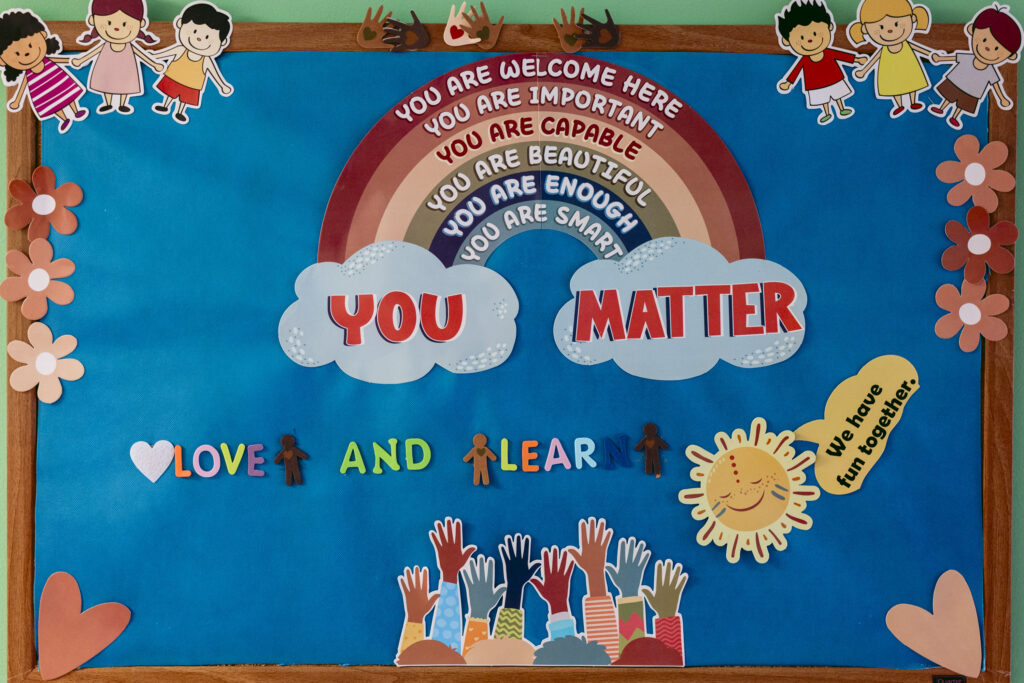
One of the first moments that made Ganzó believe Charlotte and ourBRIDGE could have a long and beautiful partnership was at a chili cookoff.
The nonprofit’s first home was at the old Central Square shopping center in Plaza Midwood. The property’s since become a huge mixed-use development, but a decade ago it was just a brick strip and a sprawling parking lot.
Each fall, that parking lot was home to the Plaza Midwood Chantilly Chili Cookoff. Ganzó and her team entered the competition in 2015, as a way to shake hands and smile with neighbors.
The kids and their families helped craft three recipes that represented different regions of the world — a white chili with Ethiopian influences, a vegetarian chili with Nepali influences, and a Spanish chorizo chili.
At the end of the event, one of the organizers came up to Ganzó and said, “You need to go to the stage.”
They’d won first place for the Spanish chorizo chili, and third for the vegetarian one. “The restaurants were so jealous — like, ‘What? Who are you?’” Ganzó recalled, laughing.
She still keeps the two plaques in the main lobby of ourBRIDGE’s eastside location.
At the time, ourBRIDGE served about 75 children from 20 different countries, with more than 65 percent coming from Southeast Asia. The Central Avenue location showcased flags and other decorations from the kids’ home countries. At the heart of the mission was the question, “Does ourBRIDGE remind you of the country you and your family are from?”
Last year, when they asked the kids to answer that question on a scale of 1 to 4, the average score was 3.9.
In 2017, ourBRIDGE moved to a building on Aldersgate’s campus off of Shamrock Drive, in the heart of Charlotte’s most diverse neighborhoods. In 2022, they opened a south location at Pinewood Elementary to serve an area where the Latino population is booming.
The program’s staff represents more than 20 countries and speaks 17 different languages. The annual operating budget’s grown from about $300,000 those first few years, to more than $2 million last year. They’ve installed a sensory garden, drawn up by a UNC Charlotte student, where kids can go if they’re stressed.
OurBRIDGE has learned countless lessons with time. During the Afghan refugee crisis of 2021, for instance, they set up a dinner for the new families, with food from that region. But they’d made one mistake: the placement of the tables.
When the new families walked in with two interpreters, they asked to rearrange the room into two long tables, with men at one and women at the other.
“We were like, ‘OK, noted,’” Ganzó said her response was. “We didn’t know.”
OurBRIDGE hired the two interpreters on the spot.

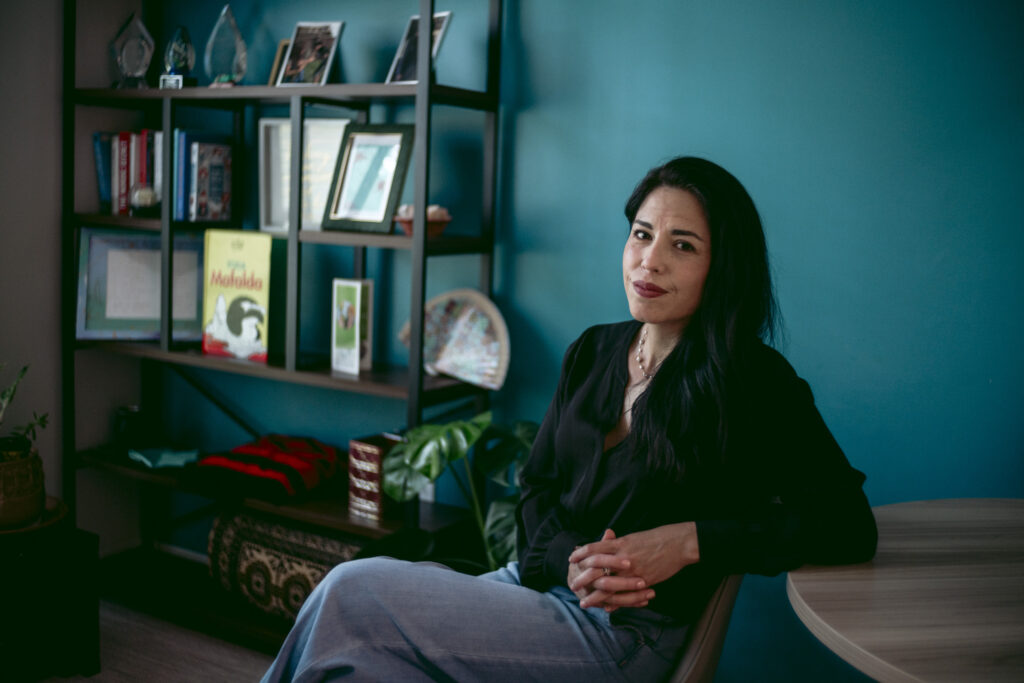
Ganzó’s been taking notes like that since she arrived in the Charlotte area more than 20 years ago.
She was 19 and struggling to find consistent work in her home of Buenos Aires, Argentina, during what’s now known as the Great Argentine Depression. One day someone handed her a flyer offering work in the United States as an au pair.
She saved travel money, applied, and got a call from a host family in Mooresville. Soon she was on a plane to Boston to go through a four-day orientation with other immigrant au pairs. She laughs now, remembering how she was expected to absorb American culture in four days in the Northeast.
Mooresville in 2002 was not Buenos Aires, or Boston. Ganzó didn’t have a room inside the host family’s house, but in a small building outside. She remembers feeling her way through the trees in the darkness each night on her way to bed.
The cabin had no TV, internet, or phone. Just a radio. Each night she would cry herself to sleep listening to the “Delilah” show.
She connected with other au pairs in the area, and sought out people from her home country. That’s how she met her future husband, also from Argentina.
After her time as an au pair, Ganzó had two kids, a boy and a girl, and “did every job that you can think of that is tied to an immigrant experience — restaurants, bartending, nannying, babysitting, pet-sitting.” She eventually landed at a chiropractor’s office and earned her certification as an X-ray technician.
Then, around 2010, she saw a Craigslist ad for a bilingual office assistant at an afterschool program that provided tutoring services for kids, and got the job. The program was for-profit, and dissolved within a few years. But Ganzó loved the work enough to keep it going, this time as a nonprofit named ourBRIDGE.

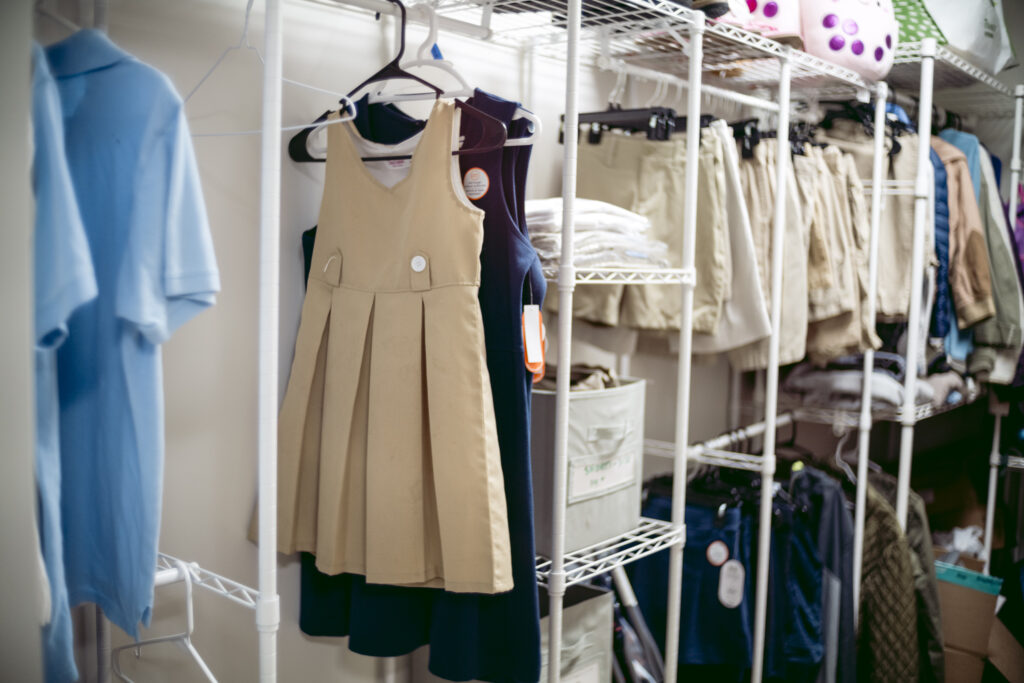
After the news stories last week, some of the initial “Bridge kids” from those early days contacted Ganzó to let her know how much the program meant to them. The notes lifted her spirits.
The past few months had worn on her, but she continued to find hope. ICE raids in east Charlotte have become frequent occurrences, but she was inspired by how one school’s PTA responded. They flooded school board members’ inboxes and meetings to ask the district to take stronger stances on arrests near schools, and to ensure that parents knew their rights when approached by immigration officers.
My former Axios colleague Russell Contreras reported last week that there have been instances around the country of U.S. citizens being wrongfully detained, but that federal officials called those reports false.
Regardless, across Charlotte, immigrant advocates are sharing difficult but necessary advice: Prepare for the worst. They’re advising parents — those with documents or without — to talk to an attorney and make legal arrangements for their children’s care, in the event Mom or Dad is detained or deported. And to do things like add family members to savings accounts, or make arrangements for pets.
“It’s like a will,” Ganzó said. “It’s awful to think about, but it’s like a will for your life as it was in the United States.”
Some signs are emerging that national sentiments around immigration have started to shift. A new Gallup poll showed that a record-high 79 percent of U.S. adults think immigration is good for the country, and that only 30 percent want immigration decreased, down from 55 percent a year ago.
Ganzó on Friday was more optimistic than at any point this month. Donations had come in through ourBRIDGE’s website. Other people offered services, such as marketing support, for free. Afterschool providers around North Carolina have a meeting set for early this week, and Ganzó is hopeful that some money will flow from there.
“The last time we spoke, I was having a full-blown panic attack,” she said Friday, three days after our Tuesday conversation. “But the outpouring of support has been great. It’s just very reassuring.”
OurBRIDGE formed at a unique moment in Charlotte history, the same year that a Harvard study ranked us last among U.S. metros in terms of economic mobility, meaning that a child born into poverty here was less likely to climb out of poverty in their lifetime than in any other American city. The study inspired a community-wide soul-searching project called the Opportunity Task Force, to examine ways to improve outcomes. The task force’s report arrived at a natural and obvious conclusion, that investing in children from low-income families, at earlier stages in their lives, was key.
In practical terms, the studies showed that supporting kids early can mean fewer interventions later — less likelihood of involvement in the justice system, more stability at home, and a stronger local workforce down the line.
Ganzó, then, became a prominent face of opportunity. OurBRIDGE evolved over time to add staff from more countries, and it focused on culturally responsive efforts to try to improve everything from attendance to graduation rates.
“You have to nourish their souls and their minds and their bodies when they’re younger so that they can see themselves in a different light when they grow up,” Ganzó told me.
Last year, an updated study showed that Charlotte moved up 12 spots in the economic mobility rankings. Playing a part in wider city missions like that helped Ganzó reframe her own story a bit — no longer was she an Argentine who happened to live in Charlotte, but a Charlottean who happened to be from Argentina.
“Coming from a big city like Buenos Aires, it’s not a jungle here,” she told me. “It’s not survival. It’s a community. Has [Charlotte] made me mad a bunch of times, and did I get into fights with councils and board members? Yes. But it’s all because I want to make it better.
“I like to think that just a little, tiny degree of empathy grew in Charlotte because of ourBRIDGE.”
She said that to me on Tuesday. By Friday, she was no longer talking about the program in the past tense.
OurBRIDGE is not going away, she said. But unless something changes with the federal funding, or unless a miracle gift drops in their account, it’ll have to shrink. She and her team are working through potential scenarios: They may put the Pinewood program on hold, or cut back on the number of children they serve at the Aldersgate location.
“This set us back 10 years. We just need to start over and figure out something different,” she said. “We don’t know what it’s going to look like, but we’re not going to disappear.”

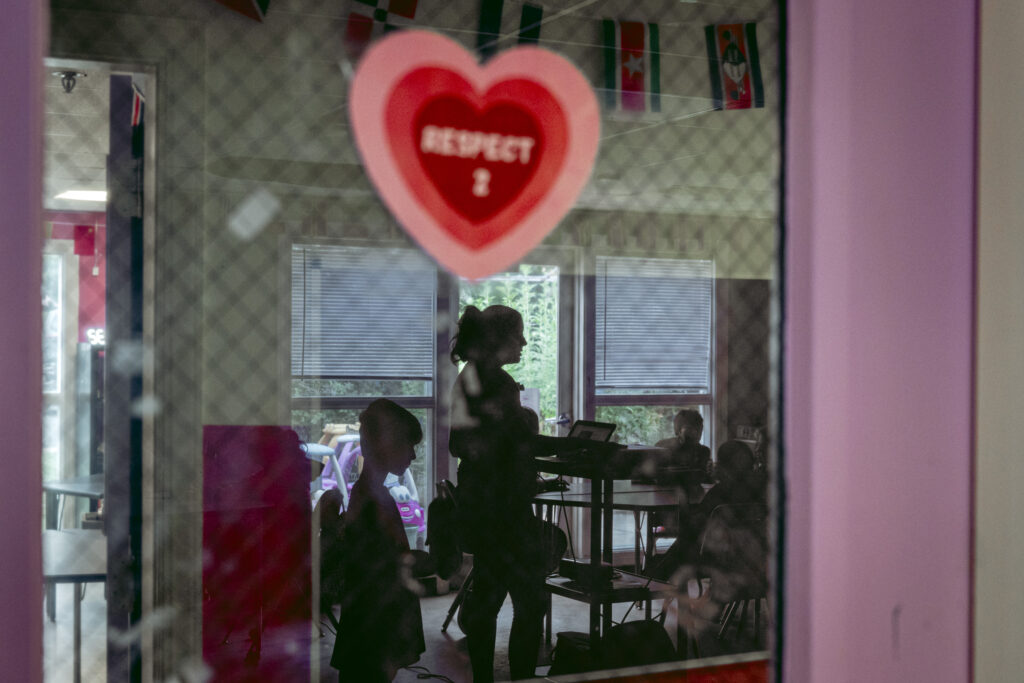
Let’s return to that Afghan boy, the booty-shakin’ one.
When he arrived four years ago, he was hyper, to put it mildly. He didn’t know how to act in a school setting. He’d get up during an activity and sprint through the hallways, without warning. He’d scream and holler. Hard to tell whether it was his natural state, or if it was a reaction to the changes in his life. In either case, he ran and ran.
OurBRIDGE’s staff has never expelled a child, Ganzó told me. In 11 years, they’ve had only one student who needed more help than they could provide. So they kept working with him, trying to connect his past home to his current home.
“It only takes one person that is outside of your family unit to believe in you, for a child’s life to be changed,” Ganzó said.
Slowly, he settled in, and his chaotic sprints became less frequent. He’s still a whirlwind of energy today, but he now understands there’s a time to booty-shake and a time to learn.
So that morning he shimmied and shook, until his teacher said the magic word.
“Annnnndd, freeze!” the teacher said. And the whole class, including the boy, stood tall and still, waiting until they could dance again.
Editor’s note: The day after this story published, N.C. Attorney General Jeff Jackson announced that his office filed a lawsuit against the Department of Education over the larger funding freeze. Over the next few weeks, the Trump administration first announced it would end the freeze for 21st Century programs, then announced it would release all of the funds it froze.
